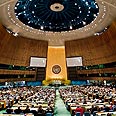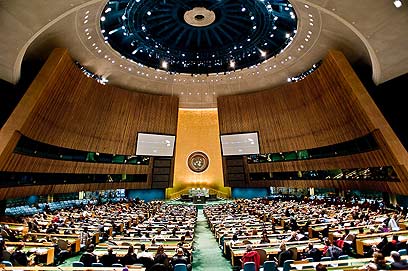
'Israel-Palestinian talks vital to Middle East'
World leaders address 66th UN General Assembly, speak of urgent matters on global agenda; urge resumption of Israeli-Palestinian peace process
NEW YORK – The second day of the 66th UN General Assembly saw world leaders focus on various urgent matters on the global agenda, but as expected, the stalemate in the Israeli-Palestinian peace process and the Palestinian bid for UN recognition took center stage.
First to speak was President of the Republic of Cyprus Dimitris Christofias, whose speech focused primarily on his country's offshore gas exploration crisis with Turkey. Turning his attention to the Israeli-Palestinian conflict, Christofias said: "The longstanding dispute in the Middle East is now characterized by frozen negotiations. It is of vital importance to resume the peace process on the basis of the principles established by the international community.
Related stories:
- Ahmadinejad: Zionist regime is not sacred
- Obama: Left with no choice, US will veto PA bid
- Palestinians torch Obama photos in Ramallah
"Cyprus supports the resumption of negotiations and calls on both sides to engage with honesty and goodwill, without creating new faits-accompli. Israelis and Palestinians alike deserve a peaceful, stable and secure future within the framework of two independent states.
"We maintain our principled position for a free and independent Palestinian state, next to the State of Israel, within the 1967 borders," he concluded.
Click on image below to view, move cursor to explore options
British Premier David Cameron, on his part, urged the United Nations to live up to its charter in fighting oppressive regimes: "The UN has to show that we can be not just united in condemnation, but united in action, acting in a way that lives up to the UN's founding principles and meets the needs of the people," he said.
Cameron said that the Arab Spring uprisings and conflict in Libya demonstrated that the UN needed "a new way of working".
The British premier said that Israel and the Palestinians "must take bold steps for peace," adding that the Palestinians had a right to a "viable state of their own" and that the international community should help them achieve it.
European Union President Herman Van Rompuy told the UNGA that "the EU's position on the Israeli-Palestinian conflict is well known. Now is the time for negotiations. The two-state solution was established 60 years ago, but only half has been implemented. The EU supports the state-building process of the Palestinian Authority and resuming the Israeli-Palestinian peace talks is our top priority."

Full house. The General Assembly (Photo: Israel Azmon)
"The legitimate aspirations of both nations must be fulfilled. An agreement must lead to two states, living side by side in peace… The Time to act is now. The leaders must take risks and thehe status quo is not an option... History is a severe judge for short- sightedness. It only rewards political courage and statesmanship," he said.
A propitious opportunity to resolve ME crisis?
Tanzania President Jakaya Mrisho Kikwete also expressed his country's support of the Palestinian bid for statehood. "Our plea is for the fulfillment of the State of Israel and the state of Palestine living side by side, in peace and harmony," he said.
King Hamad bin Isa Al Khalifa of Bahrain took the podium next. Speaking of the Palestinian UN bid, he said: "Today, more than any time in the past, the international community is offered a propitious opportunity to do justice to the brotherly Palestinian people to achieve their legitimate aspirations by recognizing their independent Palestinian state on their own national territory, with east Jerusalem as its capital.
"This would put an end to an era of bitter Arab-Israeli conflict, subject to a complete Israeli withdrawal from all occupied Arab territories to the lines of June 4, 1967 in Palestine, the occupied Syrian Arab Golan and the occupied territories in southern Lebanon, in accordance with the relevant resolutions of international legitimacy and the Arab Peace Initiative."
Chile's President Sebastián Pinera Echenique said that his country "resolutely supports" the Palestinian statehood bid with aim of achieving "just and lasting peace in the Middle East.
"Chile has the deep conviction that the Palestinians have the right to have a free, sovereign and democratic state and that the State of Israel has the right to have its borders recognized and secured… and that both people should coexists in peace and harmony."
Time to change UN?
Kyrgyzstan's president Rosa Otunbaeva said that her country's recognizes the Palestinian's wish for Statehood and "appeals to both Israel and the Palestinians to return to (the) negotiations. The Palestinians and Israel must become good neighbors under the two states (solution) and the citizens of both must enjoy peace and security." Kyrgyzstan, she concluded, "hopes for a quick resolution of the conflict."
Kuwait's ruler Sheikh Naser al-Mohammad al-Ahmad al-Sabah slammed Israel's refusal to meet the PA's demands and criticized the international community for failing to "stop Israel… whose policies continue unopposed despite the fact that they violate international law.
"These inhumane practices pursued by Israel in Gaza, among other places, and the deliberate destruction of Palestinian infrastructure despite international condemnation are a shining example of Israel's indifference to its obligations."
The Kuwaiti leader urged the international community to continue its pressure on Israel in order to "enable the Palestinian people's right for self determination in their own land with Jerusalem as its capital… and to end Israel's occupation."
The 66th UN General Assembly opened on Wednesday, with speeches by US President Barack Obama, UN Secretary-General Ban Ki-moon and French President Nicolas Sarkozy, as well as other prominent statesmen, who addressed various issues on the global body's agenda, such as the Arab Spring, the war on terror and the upcoming Palestinian statehood bid.
Attila Somfalvi and Yitzhak Benhorin in New York contributed to this report
- Follow Ynetnews on Facebook
- Receive Ynetnews updates directly to your desktop











